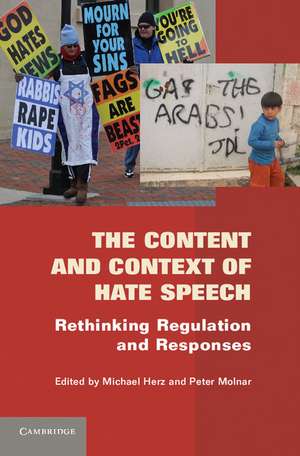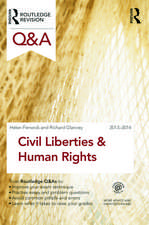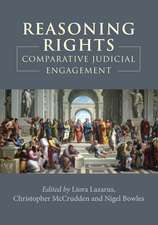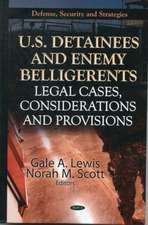The Content and Context of Hate Speech: Rethinking Regulation and Responses
Editat de Michael Herz, Peter Molnaren Limba Engleză Hardback – 8 apr 2012
| Toate formatele și edițiile | Preț | Express |
|---|---|---|
| Paperback (1) | 413.84 lei 6-8 săpt. | |
| Cambridge University Press – 8 apr 2012 | 413.84 lei 6-8 săpt. | |
| Hardback (1) | 484.47 lei 6-8 săpt. | |
| Cambridge University Press – 8 apr 2012 | 484.47 lei 6-8 săpt. |
Preț: 484.47 lei
Preț vechi: 544.35 lei
-11% Nou
Puncte Express: 727
Preț estimativ în valută:
92.71€ • 100.67$ • 77.88£
92.71€ • 100.67$ • 77.88£
Carte tipărită la comandă
Livrare economică 23 aprilie-07 mai
Preluare comenzi: 021 569.72.76
Specificații
ISBN-13: 9780521191098
ISBN-10: 0521191092
Pagini: 568
Ilustrații: 4 b/w illus. 2 tables
Dimensiuni: 156 x 235 x 22 mm
Greutate: 0.88 kg
Editura: Cambridge University Press
Colecția Cambridge University Press
Locul publicării:New York, United States
ISBN-10: 0521191092
Pagini: 568
Ilustrații: 4 b/w illus. 2 tables
Dimensiuni: 156 x 235 x 22 mm
Greutate: 0.88 kg
Editura: Cambridge University Press
Colecția Cambridge University Press
Locul publicării:New York, United States
Cuprins
Foreword: hate speech and the coming death of the international standard before it was born (complaints of a watchdog) Miklos Haraszti; Foreword: hate speech and common sense Adam Liptak; Part I. Overviews: 1. Interview with Robert Post Peter Molnar and Robert Post; 2. Is there a case for banning hate speech Bhikhu Parekh; 3. Hate speech C. Edwin Baker; 4. Interview with Kenan Malik Peter Molnar and Kenan Malik; 5. Hate speech and the demos Jamal Greene; 6. On American hate speech law Floyd Abrams; Part II. Refinements and Distinctions: 7. Social epistemology, Holocaust denial, and the post-millian calculus Frederick Schauer; 8. Denying experience: Holocaust denial and the free speech theory of the state Julie Suk; 9. What's wrong with defamation of religion? Kwame Anthony Appiah; 10. 'Hate speech' and imminent danger of violence Peter Molnar; 11. Reconceptualizing counter-speech in hate speech policy (with a focus on Australia) Katharine Gelber; 12. Hate speech and self-restraint Arthur Jacobson and Bernhard Schlink; 13. Hate speech in constitutional jurisprudence: a comparative analysis Michel Rosenfeld; 14. One step beyond hate speech: post-Soviet regulation of 'extremist' and 'terrorist' speech in the media Andrei Richter; 15. Hate speech and comprehensive forms of life Alon Harel; Part III. Equality and Fear: 16. Hate speech and political legitimacy Jeremy Waldron; 17. Reply to Jeremy Waldron Ronald Dworkin; 18. Waldron, Machiavelli, and hate speech Stephen Holmes; 19. Shielding marginalized groups from verbal assaults without abusing hate speech laws Yared Legesse Mengistu; 20. Interview with Nadine Strossen Peter Molnar and Nadine Strossen; 21. Interview with Theodore Shaw Peter Molnar and Theodore Shaw; Part IV. International Law: 22. Does international law provide for consistent rules on hate speech? Toby Mendel; 23. State-sanctioned incitement to genocide: the responsibility to prevent Irwin Cotler; 24. A survey and critical analysis of Council of Europe strategies for countering 'hate speech' Tarlach McGonagle; 25. The American convention on human rights: regulation of hate speech and similar expression Eduardo Bertoni and Julio Rivera, Jr; 26. Orbiting hate: satellite transponders and free expression Monroe Price.
Recenzii
'… a wide and encompassing look at hate speech in its various forms and the various factors (of which modern communications is but one) that push for a rethink of regulations. … The Content and Context of Hate Speech is a useful and enjoyable book for anyone who is interested in the issue, whether as part of academic research, as a participant in the public debate or as a media professional. The book can be read through from beginning to end, to challenge the mind and get new ideas, or it can be used to go deeper on specific issues through the interesting sources referred to and the many new facts presented.' Katrin Merike Nyman-Metcalf, International and Comparative Law Quarterly
'The 'context' of anti-Gypsyism, and the connections between hateful words and heinous deeds pose profound and troubling questions for champions of free speech and opponents of content-based bans … This stimulating collection of interviews and essays edited by Herz and Molnar provides a singularly comprehensive rethink on responses to the content and context of hate speech.' Bernard Rorke, European Roma Rights Centre (ERRC) blog
'[The title] The Content and Context of Hate Speech: Rethinking Regulation and Responses is well chosen for the collection of essays assembled by [Herz and Molnar] … To the extent that this can be done in a few words, it encapsulates an important part of the debate over what to do about hate speech. The essays reflect a broad consensus that hate speech is one of the afflictions of our era and that there is a need to counter it. … There is much to admire in the essays …' Aryeh Neier, International Journal of Constitutional Law
'The 'context' of anti-Gypsyism, and the connections between hateful words and heinous deeds pose profound and troubling questions for champions of free speech and opponents of content-based bans … This stimulating collection of interviews and essays edited by Herz and Molnar provides a singularly comprehensive rethink on responses to the content and context of hate speech.' Bernard Rorke, European Roma Rights Centre (ERRC) blog
'[The title] The Content and Context of Hate Speech: Rethinking Regulation and Responses is well chosen for the collection of essays assembled by [Herz and Molnar] … To the extent that this can be done in a few words, it encapsulates an important part of the debate over what to do about hate speech. The essays reflect a broad consensus that hate speech is one of the afflictions of our era and that there is a need to counter it. … There is much to admire in the essays …' Aryeh Neier, International Journal of Constitutional Law
Descriere
This volume considers whether it is possible to establish carefully tailored hate speech policies that recognize the histories and values of different countries.













